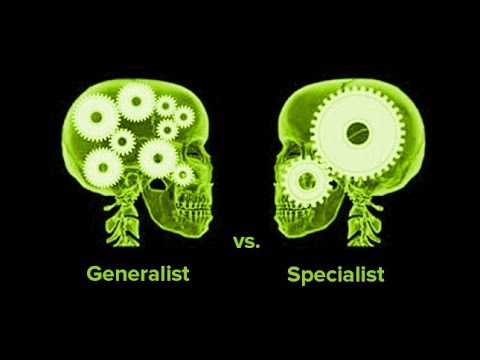Marketers Of The Future: Specialists Vs. Generalists
Marketers Of The Future: Specialists Vs. Generalists
It’s no wonder marketers’ heads are spinning. Today’s always-connected and increasingly empowered consumers place elevated expectations on every interaction they have with a brand, whether online, in-store, or on their mobile device. These heightened expectations are forcing marketers to re-evaluate their strategies, so they can deliver relevant and personalized experiences to each individual.
One way in which marketers are tackling this issue is by restructuring their internal teams. Traditionally, marketing departments have consisted of a team of generalists who know a little bit about various marketing techniques, such as paid search, email marketing, and social media marketing. However, it’s next to impossible for generalist marketers to be experts in all areas of the consumer journey.

For this reason, brands are starting to staff their teams with marketing specialists — trained marketers who understand how and where consumers engage with their brand and can identify opportunities to optimize the value each interaction. This enables the specialists to create more engaging experiences that forge deeper, more authentic relationships with their customers and prospects.
Defining the specialist role
As any marketer knows, understanding the target audience is key to success. If marketers can’t get an accurate and holistic view of consumers as they traverse across multiple channels, devices and touchpoints, then they can’t accurately measure the value of each interaction or how well they’re moving them towards on online conversion, in-store visit, repeat purchase or other desired outcome.
By aligning along the consumer journey, marketing specialists will gain deeper insight into who their prospects and customers are, what they like, and how they behave, so they can deliver more relevant content, messages, and offers that drive action. Specialists may manage different parts of the funnel or be responsible for inbound or outbound marketing — there’s no right or wrong way to organize the team. The right structure will depend on what works best for the brand and what will deliver optimal results.
New role, new skill sets
Marketing specialists must have many of the skills that generalists have today, but also need to stay on top of the newest trends and techniques. In the past, most companies had small in-house marketing teams with bigger budgets, and they outsourced their advertising to agencies with cutting-edge technologies and approaches. Now, marketing teams are bigger but have smaller budgets to work with.
Instead of outsourcing to agencies, teams are leveraging a number of technologies to accomplish more on their own. When the data that these systems produce is collected, consolidated, and normalized in a single, centralized repository, marketing specialists can work together towards shared goals, while harvesting the real-time insights they need to respond to changes in consumer behavior and quickly capitalize on optimization opportunities.
Pros and cons
One challenge brands may face is finding and hiring marketing specialists with the right skill sets and knowledge. Marketing is like a fine symphony orchestra — many different instruments must work together in order to create beautiful harmonies. To create a symphony, marketing leaders (the conductors) must be able to put the right performers together who have their own specific areas of responsibility yet work perfectly in sync.
Consumers will only continue to demand more meaningful experiences with brands, so it’s up to marketers to adapt to these needs. By shifting from a marketing generalist to a marketing specialist model, brands will be able to provide more relevant and engaging experiences for consumers that forge stronger relationships and lasting loyalty.
(43)

